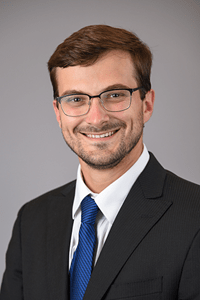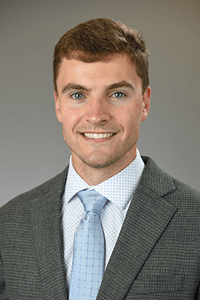As residency progresses, many physicians begin to see themselves not just as clinicians, but also as educators shaping the next generation of learners. For two Indiana University School of Medicine otolaryngology residents, the journey from student to teacher took on new meaning through participation in the Clinician-Educator Training Pathway (CETP).
This pathway is a two-year program designed for those who are passionate about teaching in medicine. It equips trainees with the tools, skills and confidence to thrive as clinician-educators. Participants become part of a vibrant, collaborative community of educators who support and learn from one another.
Harrison Thompson, MD (PGY 5) recently graduated from the program, and Gabriel Sobczak, MD (PGY 4) has begun the second year. While there wasn’t one defining moment or mentor that led to their decisions to enroll in the program, the accumulation of learning moments throughout residency proved transformative.
 “During residency, I have had my eyes opened to the challenges and exciting prospect of surgical medical education," Thompson said. “I have found that I have a particular interest in early learner education, as I think the most benefit and progress can be made in the shortest time at the PGY 1-2 level.”
“During residency, I have had my eyes opened to the challenges and exciting prospect of surgical medical education," Thompson said. “I have found that I have a particular interest in early learner education, as I think the most benefit and progress can be made in the shortest time at the PGY 1-2 level.”
Both residents find that CETP offers more than just an introduction to teaching — it provides a framework for thinking about education as a career.
“One of the most valuable things I learned was how to give effective, actionable feedback,” Sobczak said. “It’s something we’re expected to do all the time, yet most of us never receive formal training on it.”
Both otolaryngology residents are committed to continuing their roles as educators, with distinct visions for the future. “I hope to gain more insights into quality improvement initiatives,” Thompson said. “We learned some about these in the CETP program, and I think there is some benefit to applying these principles to education development.”
“I enjoy working with medical students, so I envision a role in which I help to improve or develop a formal, pre-clinical ENT curriculum for medical students,” Sobczak added. “First and foremost, no matter what specialty students ultimately choose, they will work with patients who have ENT problems. Additionally, because ENT rotations are almost universally elective across institutions, most students who apply for ENT residency must seek it out, so providing earlier exposure could broaden our applicant pool.”
To residents considering the clinician-educator pathway, Sobczak and Thompson offer enthusiastic encouragement. “I highly recommend joining the CETP,” said Thompson. “It is a wonderful program that helps give future educators a framework for a successful career in medical education.

“In general, most residents have ideas about how to improve various aspects of their education, be it didactics, grand rounds, or morbidity and mortality conferences,” Sobczak said. “CETP provides a safe environment to formalize these ideas and potentially effect impactful changes to the residency program.”
“Dr. Thompson and Dr. Sobczak have been the ideal participants for this program,” said Christen Dilly, MD, assistant dean of Graduate Medical Education. “Of course they are delightful people, but sharing their experiences as surgical residents added so much to our community of educators. We are delighted to see what these talented physicians have accomplished so far, and we look forward to seeing what they do with their new skills."
“It’s wonderful to see Dr. Thompson and Dr. Sobczak leaning into their roles as educators through the CETP,” added Jonathan Ting, MD, chair of the Otolaryngology—Head and Neck Surgery Department at the IU School of Medicine. “They have brought fresh ideas and energy to our teaching efforts, and it’s clear they’re already making a difference. I’m excited to see how they continue to grow as leaders in medical education.”
Residency is not just about becoming a skilled clinician — it is also about becoming a leader, a mentor and an advocate for better learning. For these CETP graduates, and many others, education isn’t a side project — it’s part of their professional identity. As they move forward in their careers, their dedication to education will undoubtedly leave a lasting impact on future generations of learners.
